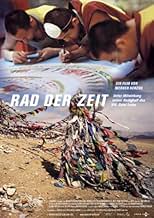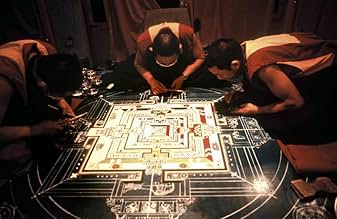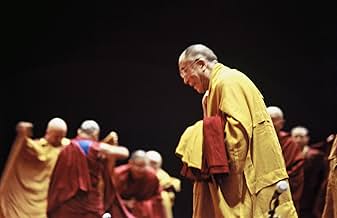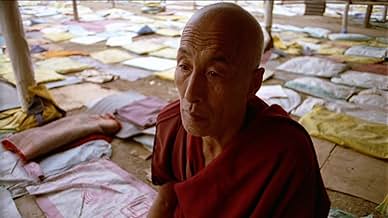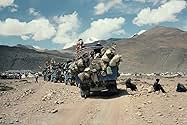AVALIAÇÃO DA IMDb
7,1/10
2,8 mil
SUA AVALIAÇÃO
Adicionar um enredo no seu idiomaWheel of Time is Werner Herzog's photographed look at the largest Buddhist ritual in Bodh Gaya, India.Wheel of Time is Werner Herzog's photographed look at the largest Buddhist ritual in Bodh Gaya, India.Wheel of Time is Werner Herzog's photographed look at the largest Buddhist ritual in Bodh Gaya, India.
- Direção
- Roteirista
- Artistas
Avaliações em destaque
In 2002 Werner Herzog went to India to observe the festival of Kalachakra, the ritual that takes place every few years to allow Tibetan Buddhist monks to become ordained. An estimated 500,000 Buddhists attended the initiation at Bodh Gaya, the land where the Buddha is believed to have gained enlightenment. The resulting documentary, Wheel of Time, is not a typical Herzog film about manic eccentrics at odds with nature but an often sublime look at an endangered culture whose very way of life is threatened. Herzog admits that he knows little about Buddhism and we do not learn very much about it in the film, yet as we observe the rituals, the celebrations, and the devotion of Tibetan Buddhists we learn much about the richness of their tradition and their strength as a people.
The festival, which lasts ten days, arose out of the desire to create a strong positive bond for inner peace among a large number of people. One notices the almost complete absence of women yet the film ignores it and the narrator makes no comment. The monks begin with chants, music, and mantra recitation to bless the site so that it will be conducive for creating the sand mandala. The magnificently beautiful mandala, which signifies the wheel of time, is carefully constructed at the start of the festival using fourteen different tints of colored sand, then dismantled at the end to dramatize the impermanence of all things. Once built, it is kept in a glass case for the duration of the proceedings so that it will not be disturbed. The most striking aspect of the film are the scenes showing the devotion of the participants.
Using two interpreters, Herzog interviews a monk who took three and one-half years to reach the festival while doing prostrations on the 3000-mile journey. The prostrations, which are similar to bowing and touching the ground, serve as a reminder that we cannot reach enlightenment without first dispelling arrogance and the affliction of pride. In this case, the monk has developed lesions on his hand and a wound on his forehead from touching the earth so many times, yet it hasn't dampened his spirit. Other Buddhists are shown trying to do 100,000 prostrations in six weeks in front of the tree under which the Buddha is supposed to have sat. Herzog introduces a moment of humor when he films a young child imitating the adults by doing his own prostrations but not quite getting the hang of it. In a sequence of rare beauty accompanied by transcendent Tibetan music, we see a Buddhist pilgrimage to worship at the foot of 22,000-foot Mount Kailash, a mountain that is considered in Buddhist and Hindu tradition to be the center of the universe.
The Dalai Lama explains wryly, however, that in reality each of us is truly the center of the universe. After waiting in long lines to witness the Dalai Lama conduct the main ceremony, the crowd is shocked into silence when he tells them that he is too ill to conduct the initiation and will have to wait until the next Kalachakra meeting in Graz, Austria in October. The Graz initiation ceremony is much smaller, however, being confined to a convention hall that can only fit 8000 people; however, everyone is grateful to see the Dalai Lama restored to health. In Austria, Herzog interviews a Tibetan monk who has just been released from a Chinese prison after serving a sentence of thirty-seven years for campaigning for a "Free Tibet". His ecstasy in greeting the Dalai Lama is ineffable. During the closing ceremony, the monks dismantle the Mandala, sweeping up the colored sands and the Dalai Lama releases the mixed sand to the river as a means of extending blessings to the world for peace and healing.
Herzog's mellifluous voice lends a measure of serenity to the proceedings and he seems to be a sympathetic observer. While he makes every effort not to be intrusive, he cannot resist staging a scene toward the end of the film in which a bodyguard is seen presiding over an almost empty convention hall to illustrate the Buddhist concept of emptiness. Wheel of Time may not be Herzog's best work but it does contain moments of grace and images of spectacular beauty. Because of the destruction of their heritage, the Tibetans survive today mainly in the refugee camps of India. Any effort that promotes an understanding of their culture is very welcome and Wheel of Time provides us with an insight into an ancient tradition geared toward perfecting humanity through quieting the mind and cultivating compassion.
The festival, which lasts ten days, arose out of the desire to create a strong positive bond for inner peace among a large number of people. One notices the almost complete absence of women yet the film ignores it and the narrator makes no comment. The monks begin with chants, music, and mantra recitation to bless the site so that it will be conducive for creating the sand mandala. The magnificently beautiful mandala, which signifies the wheel of time, is carefully constructed at the start of the festival using fourteen different tints of colored sand, then dismantled at the end to dramatize the impermanence of all things. Once built, it is kept in a glass case for the duration of the proceedings so that it will not be disturbed. The most striking aspect of the film are the scenes showing the devotion of the participants.
Using two interpreters, Herzog interviews a monk who took three and one-half years to reach the festival while doing prostrations on the 3000-mile journey. The prostrations, which are similar to bowing and touching the ground, serve as a reminder that we cannot reach enlightenment without first dispelling arrogance and the affliction of pride. In this case, the monk has developed lesions on his hand and a wound on his forehead from touching the earth so many times, yet it hasn't dampened his spirit. Other Buddhists are shown trying to do 100,000 prostrations in six weeks in front of the tree under which the Buddha is supposed to have sat. Herzog introduces a moment of humor when he films a young child imitating the adults by doing his own prostrations but not quite getting the hang of it. In a sequence of rare beauty accompanied by transcendent Tibetan music, we see a Buddhist pilgrimage to worship at the foot of 22,000-foot Mount Kailash, a mountain that is considered in Buddhist and Hindu tradition to be the center of the universe.
The Dalai Lama explains wryly, however, that in reality each of us is truly the center of the universe. After waiting in long lines to witness the Dalai Lama conduct the main ceremony, the crowd is shocked into silence when he tells them that he is too ill to conduct the initiation and will have to wait until the next Kalachakra meeting in Graz, Austria in October. The Graz initiation ceremony is much smaller, however, being confined to a convention hall that can only fit 8000 people; however, everyone is grateful to see the Dalai Lama restored to health. In Austria, Herzog interviews a Tibetan monk who has just been released from a Chinese prison after serving a sentence of thirty-seven years for campaigning for a "Free Tibet". His ecstasy in greeting the Dalai Lama is ineffable. During the closing ceremony, the monks dismantle the Mandala, sweeping up the colored sands and the Dalai Lama releases the mixed sand to the river as a means of extending blessings to the world for peace and healing.
Herzog's mellifluous voice lends a measure of serenity to the proceedings and he seems to be a sympathetic observer. While he makes every effort not to be intrusive, he cannot resist staging a scene toward the end of the film in which a bodyguard is seen presiding over an almost empty convention hall to illustrate the Buddhist concept of emptiness. Wheel of Time may not be Herzog's best work but it does contain moments of grace and images of spectacular beauty. Because of the destruction of their heritage, the Tibetans survive today mainly in the refugee camps of India. Any effort that promotes an understanding of their culture is very welcome and Wheel of Time provides us with an insight into an ancient tradition geared toward perfecting humanity through quieting the mind and cultivating compassion.
Wheel of Time is a curious documentary crucially because of someone from the West, like myself, being privy to traditional customs and ceremonial practices that seem like they could be coming from another world. But, as one soon learns, this curiosity is strong because it IS apart of this world, and maybe the truest moment of clarity from the Dalai Lama himself comes when he states how the universe is really not owned by one country or apart of one mountain or other, but is in how an individual conceives it- the universe, the center of it, is in you, or at least your projection of what it is, which is not something collective but ultimately is. It's a very wise statement that will keep me pondering it over for a long time. Likewise, the Kalachakra mandala becomes like a metaphor for this ideal, of hundreds of thousands of people coming together for the purpose of- aside from getting priceless words from the Dalai Lama- being at inner peace with oneself, hence the universe.
By the end of Wheel of Time I didn't know much more about Buddhism than I had going into it, which isn't any real fault on Herzog's end as a filmmaker; it doesn't illuminate and challenge the mind too much like other documentaries of the filmmaker, but it's also nevertheless unique in Herzog's cannon for what he does and doesn't take on with his subject(s). On the one hand, he's endlessly fascinated with ritual, with physical movements, of the masses of people who have gone on this pilgrimage from thousands of miles from all over the continent for this once-in-two-years event (this adds a dosage of climactic irony for what happens there- an 'illness'). It's anthropological to an extent, only it's not one of everyday culture so much as the unheeding devotion to a religion based around enlightenment, not suffering via a messiah or other. On the other hand, Herzog relies this time on just being a guy with a camera, moving around these swarms of people, and this time Herzog relents for the most part to "directing landscapes" as he usually does to just catching people's faces, their body language, and the instruments at their disposal (which are, usually, their own bodies, as in their bowing-type moves to attain a level, and crawling on ones hands and face across land for a purpose). It's actually, for Herzog, kind of conventional, bordering on being something one might expect for television.
But this little note shouldn't discourage one from seeing the film, and whether you're a Buddhist or not it holds its own aura that provides moments almost akin to what the Dalai Lama wants for his pupils and followers. One's even reminded of Woodstock in comparison of a documentary that goes out of its way to show more-so the nature of the people who gather together, and the power of a gathering, than the actual acts themselves. On top of this, Herzog does the occasional focus on an individual (albeit a little sidetracked as it is during the climax) with a political prisoner released from China and allowed to finally "see" the Dalai Lama in person. And for Herzog fans who are always on the prowl for his 'adequate images', there's still a good few to go around here, like when he captures the mountains that the Tibetans go to in masses, or the final images, including one that is as haunting as anything Herzog's shot. It's a peaceful, brisk journey; not a great work, but not an insignificant one either.
By the end of Wheel of Time I didn't know much more about Buddhism than I had going into it, which isn't any real fault on Herzog's end as a filmmaker; it doesn't illuminate and challenge the mind too much like other documentaries of the filmmaker, but it's also nevertheless unique in Herzog's cannon for what he does and doesn't take on with his subject(s). On the one hand, he's endlessly fascinated with ritual, with physical movements, of the masses of people who have gone on this pilgrimage from thousands of miles from all over the continent for this once-in-two-years event (this adds a dosage of climactic irony for what happens there- an 'illness'). It's anthropological to an extent, only it's not one of everyday culture so much as the unheeding devotion to a religion based around enlightenment, not suffering via a messiah or other. On the other hand, Herzog relies this time on just being a guy with a camera, moving around these swarms of people, and this time Herzog relents for the most part to "directing landscapes" as he usually does to just catching people's faces, their body language, and the instruments at their disposal (which are, usually, their own bodies, as in their bowing-type moves to attain a level, and crawling on ones hands and face across land for a purpose). It's actually, for Herzog, kind of conventional, bordering on being something one might expect for television.
But this little note shouldn't discourage one from seeing the film, and whether you're a Buddhist or not it holds its own aura that provides moments almost akin to what the Dalai Lama wants for his pupils and followers. One's even reminded of Woodstock in comparison of a documentary that goes out of its way to show more-so the nature of the people who gather together, and the power of a gathering, than the actual acts themselves. On top of this, Herzog does the occasional focus on an individual (albeit a little sidetracked as it is during the climax) with a political prisoner released from China and allowed to finally "see" the Dalai Lama in person. And for Herzog fans who are always on the prowl for his 'adequate images', there's still a good few to go around here, like when he captures the mountains that the Tibetans go to in masses, or the final images, including one that is as haunting as anything Herzog's shot. It's a peaceful, brisk journey; not a great work, but not an insignificant one either.
Famed German filmmaker Werner Herzog and his crew travel to a Buddhist pilgrimage site in Bodgaya, India. There they film the believers as they do the many tasks that they feel lead to greater enlightenment. The film's title is about a sand drawing or a 'mandala' that is created for this event.
While my summary is pretty much true of all films, it's especially true of "Wheel of Time". If you have no interest in Buddhism or don't like documentaries that are light on narration and thorough explanations, then you'll probably not enjoy this film. This isn't meant pejoratively--it's just that your interests will really have a lot to do with whether I'd recommend it to you. As a retired history teacher who often taught about world religions, I already had a reasonable understanding of many of the tenants of Buddhism as well as an interest in learning more. But I am NOT the typical person. And, I don't mind the vagueness in the narrative of this film very much--though I would have appreciated it if the film had talked about the basic beliefs of the religion. In other words, before attempting a discussion of the confusion topic of 'mandalas' (something which, it appeared, even the Dalai Lama had a hard time explaining in the film), perhaps it would have been best to discuss other aspects of the religion.
Things of interest to watch for would include the vat of tea (that's a lotta tea!), the great lengths to which some of the followers go to get there, the anticlimactic aspects of the pilgrimage and the later visit to Graz, Austria. Not for all tastes, but worth seeing if it is yours.
While my summary is pretty much true of all films, it's especially true of "Wheel of Time". If you have no interest in Buddhism or don't like documentaries that are light on narration and thorough explanations, then you'll probably not enjoy this film. This isn't meant pejoratively--it's just that your interests will really have a lot to do with whether I'd recommend it to you. As a retired history teacher who often taught about world religions, I already had a reasonable understanding of many of the tenants of Buddhism as well as an interest in learning more. But I am NOT the typical person. And, I don't mind the vagueness in the narrative of this film very much--though I would have appreciated it if the film had talked about the basic beliefs of the religion. In other words, before attempting a discussion of the confusion topic of 'mandalas' (something which, it appeared, even the Dalai Lama had a hard time explaining in the film), perhaps it would have been best to discuss other aspects of the religion.
Things of interest to watch for would include the vat of tea (that's a lotta tea!), the great lengths to which some of the followers go to get there, the anticlimactic aspects of the pilgrimage and the later visit to Graz, Austria. Not for all tastes, but worth seeing if it is yours.
It's interesting to read that Werner Herzog wasn't an expert on Buddhism when he filmed this. In a way, that's the charm of this film. Essentially we're given a backstage pass to a Buddhist festival. In Herzog fashion, he holds the camera longer than most, filming his subjects looking for any reaction. In a childlike way, it could be very compelling. Especially since this world is so strange to most westerners that the audience is like any tourists in a strange land. We stare a little too long.
My only complaint is he ended the movie in the wrong place. Just because The Dalai Lama couldn't finish the rituals doesn't mean the movie needs to go to another continent to find a happy ending.
My only complaint is he ended the movie in the wrong place. Just because The Dalai Lama couldn't finish the rituals doesn't mean the movie needs to go to another continent to find a happy ending.
I just saw Wheel of Time yesterday at its premiere in Toronto, where Herzog was present. As usual, Herzog creates a compelling film: a portrait of a traditional Bhuddist initiation ceremony. Specifically, we are shown the pilgrimmage of hundreds of thousands of people to India and one year later, to a similar ceremony in Austria. On a purely documentary level, this winning film is a fascinating piece, giving insight into this ancient ceremony (including the pilgrimmage itself), as well as showing us the painstaking construction of a large "mandala" made out of colored sand, with a "wheel of time" intricately designed in its center. The interviews with the Dalai Lama were interesting and even humorous. On an artistic level, it is also a winner, as Herzog mixes stylistic poses and environmental landscapes within the structure of the documentary. Of course, Herzog's critics call this self-indulgence, but I strongly disagree. Herzog operates on a subconcious level in most of his films, including his narrative features, and actually succeeds where other "artsy" filmmakers fail miserably. Herzog has produced yet another fascinating masterpiece.
Você sabia?
- Citações
The Dalai Lama: All religions carry same message. Message of love, compassion, forgiveness, tolerance, contentment, self-discipline. I think we need these qualities, irrespective of whether we are believer or non-believer, because these are the source of a happy life.
- Trilhas sonorasHimal
Performed by Prem Rama Autari
Principais escolhas
Faça login para avaliar e ver a lista de recomendações personalizadas
- How long is Wheel of Time?Fornecido pela Alexa
Detalhes
Contribua para esta página
Sugerir uma alteração ou adicionar conteúdo ausente

Principal brecha
By what name was Wheel of Time (2003) officially released in Canada in English?
Responda
